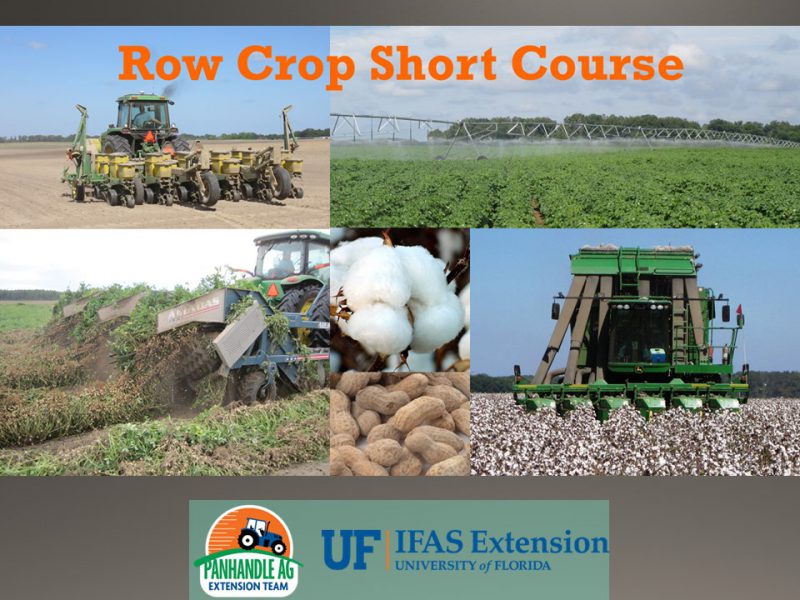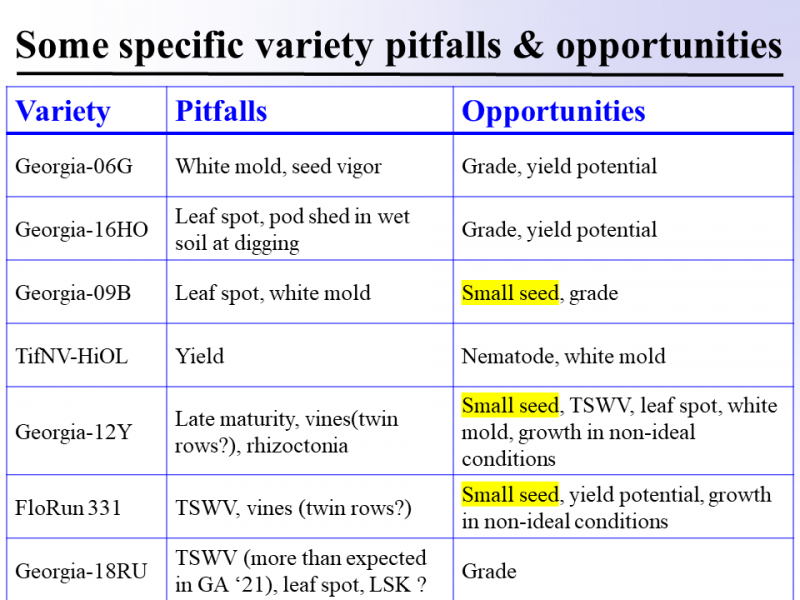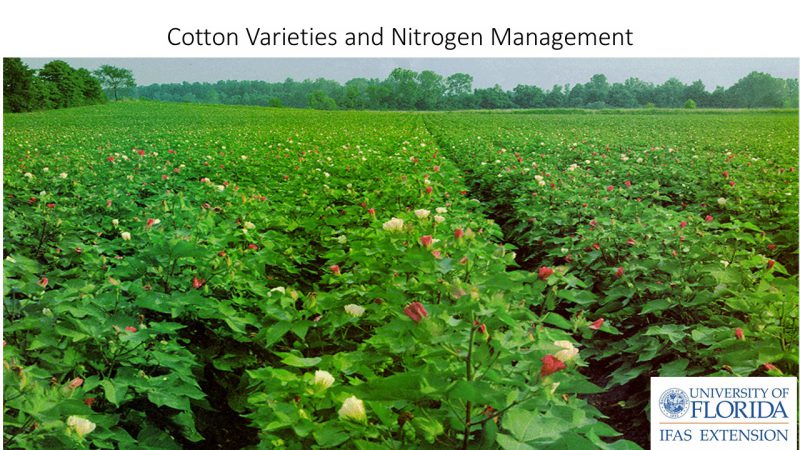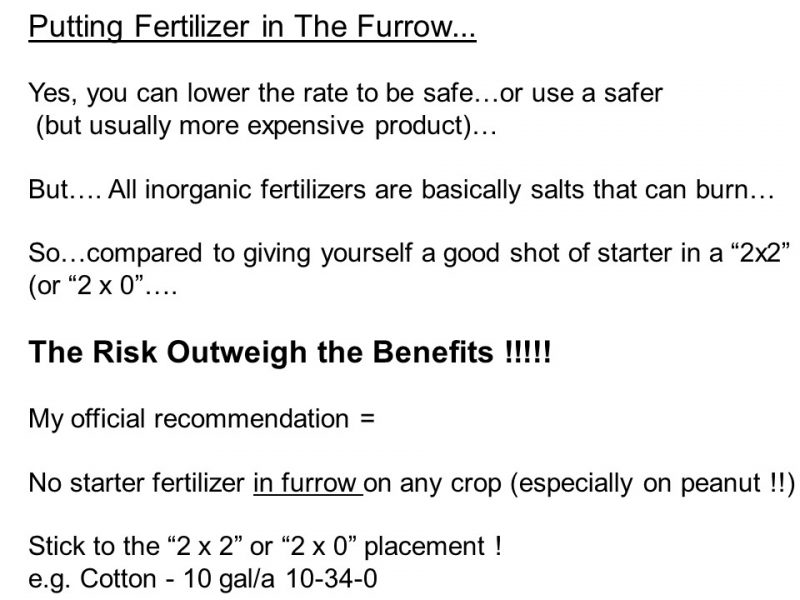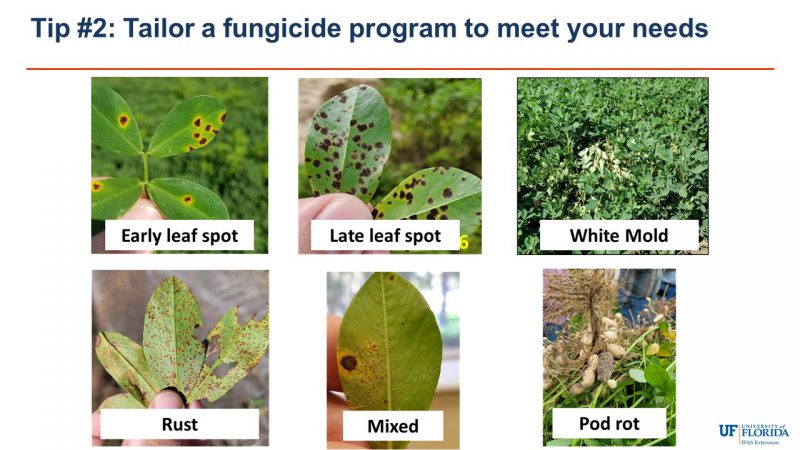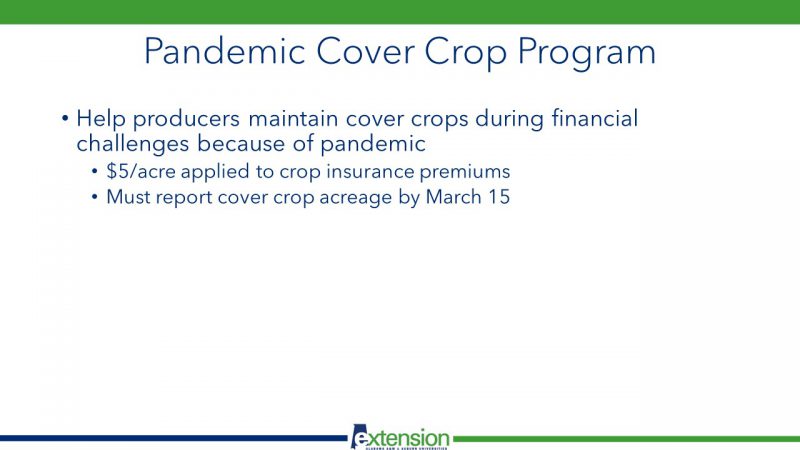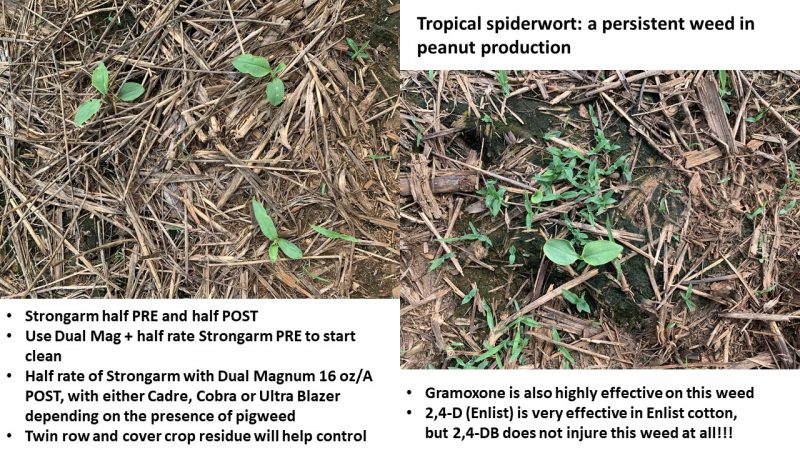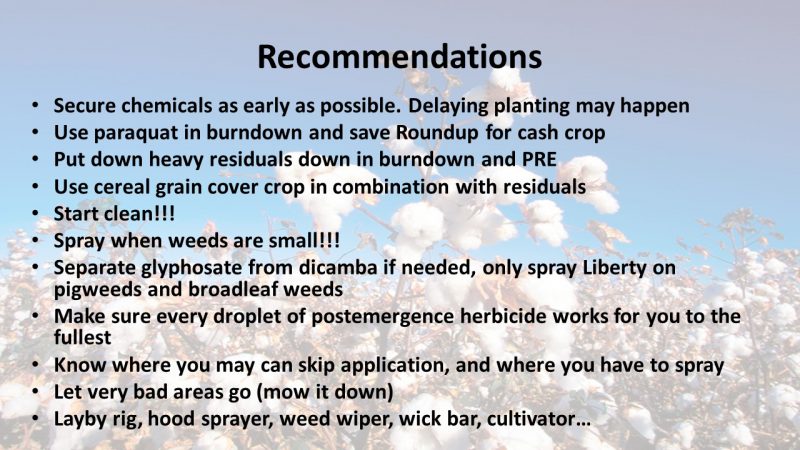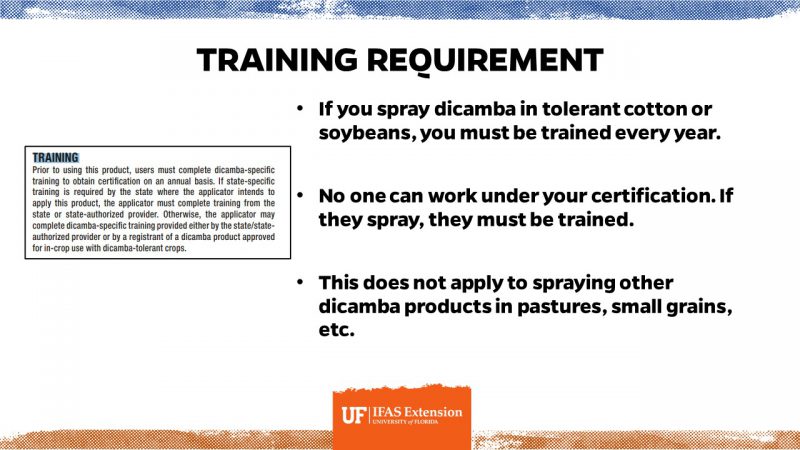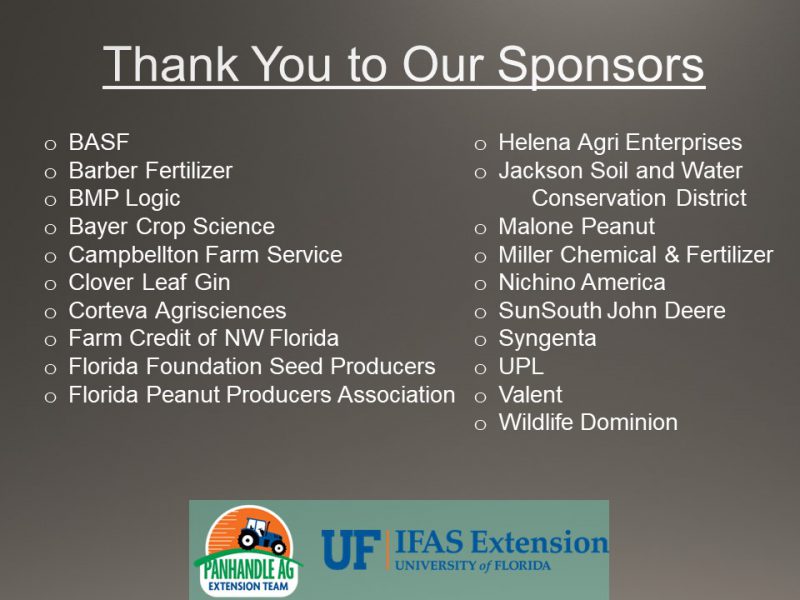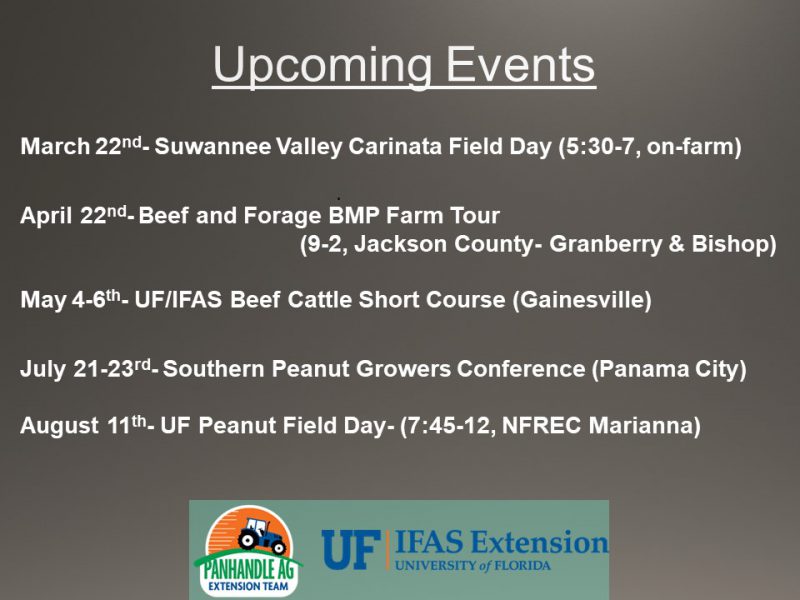The 2022 Panhandle Row Crop Short Course was held Thursday, March 3. Extension Specialists from Florida, Georgia, and Alabama spoke to attendees providing key production recommendations and tips for row crop farmers during a time when input costs are skyrocketing. Continuing education units (CEUs) were offered at the event for those with a restricted use pesticide license (Florida and Georgia), as well as for Certified Crop Advisors. This event also met the annual Dicamba Stewardship Training requirement for applicators spraying dicamba over top of cotton and soybeans. If you missed this program and still need a 2022 Dicamba Stewardship Training, you can complete it online through UF or an approved industry source.
The focus of the Short Course was peanut and cotton production. Speaker topics included an update from the Florida Peanut Producers Association, information regarding peanut and cotton varieties, fertility management, pest management (disease and weeds), a market update, and the dicamba training. The following recap provides a short summary of what was discussed by each speaker, as well as direct links to download PDF (printable) versions of the presentations given at the event.
–
Industry Update
Ken Barton, Executive Director of the Florida Peanut Producers Association (FPPA) provided an update on the current status of the peanut industry, along with the goals of the FPPA. He also reminded growers that the Southern Peanut Growers Conference will be held this year July 21-23rd in Panama City.
Presentation link: Barton – Florida Peanut Producers Update
–
Peanut Variety Selection
Dr. Barry Tillman, UF/IFAS Peanut Breeder, provided variety data from trials across Florida and Georgia demonstrating trends in performance. Hypothetical production situations were used to illustrate management decisions based on factors such as planting date, disease pressure, and risk. He also discussed using variety selection and seed size as an opportunity to lower input costs.
Presentation link: Tillman- Peanut Variety Performance
–
Cotton Variety Performance
Dr. David Wright, UF/IFAS Agronomist, presented data on cotton variety performance and nitrogen management. Information shared included both data from research stations and on-farm trials across Florida and Georgia. Performance data from several different trial locations were shown to illustrate consistency of variety performance in low, mid, and high yielding environments.
Presentation link: Wright- Cotton Variety Performance
–
Fertility Management
Dr. Glen Harris, UGA Soil Scientist, discussed crop fertility needs, nutrient sources, and overall input N-P-K needs and costs. He recommended producers focus their time and resources on soil sampling, pH and liming, micronutrients (like Boron), and sulfur on cotton and corn specifically.
Presentation link: Harris- Crop Disease Management
–
Crop Disease Management
Dr. Nicholas Dufault, UF/IFAS Crop Pathologist, discussed disease management in cotton and peanut. Application timing, product performance, and modes of action were also discussed.
Presentation link: Dufault- Crop Disease Management
–
Update on the Market
Dr. Adam Rabinowitz, AU Economist, provided an analysis of the commodity crop markets. Understanding what factors drive the market and the projected revenues and costs associated with growing different crops allowing producers to make informed decisions. With input prices skyrocketing, it is more important than ever to farm efficiently as possible.
Presentation link: Rabinowitz- Update on the Market
–
Peanut Weed Management in 2022
Dr. Steve Li, AU Weed Scientist, discussed control options and strategies of troublesome weeds. With chemical prices increasing and some products being hard to locate, he stressed the importance of utilizing preemergent herbicides. Another major weed control strategy is high biomass cover crops, residues can greatly reduce weed seed germination and emergence rates in the field.
Presentation Link: Li – Peanut Weed Management in 2022
–
Cotton Weed Management in 2022
Dr. Steve Li, AU Weed Scientist, discussed control options and strategies of troublesome weeds. With chemical prices increasing and some products being hard to locate, he stressed the importance of getting chemicals as early as possible and also utilizing preemergent herbicides. Other major weed control strategies included the use of high biomass cover crops to reduce weed stands, not cutting herbicide rates when behind on large weeds, and to think about possibly bringing out the layby rig, hooded sprayer, wiper, or cultivator this year.
Presentation Link: Li – Cotton Weed Management in 2022
–
Dicamba Stewardship Training 2022: Use in Cotton and Soybean
Dr. Pratap Devkota, UF/IFAS Weed Specialist, discussed updates to the dicamba products registered for over-the-top use in cotton and soybean (XtendiMax, Engenia, and Tavium). These products have use restrictions pertaining to application windows, frequency, buffer zones, and more. All applicators who want the option of applying these products in cotton or soybean are required to have a 2022 Dicamba Training. Applicators using any of these three products on dicamba tolerant cotton or soybean are required to have their own pesticide license, there is no supervision of unlicensed applicators allowed.
Presentation link: Devkota – Dicamba Stewardship Training 2022: Use in Cotton and Soybean
–
Sponsors and Trade Show Exhibitors
These 20 companies and organizations took part in the Trade Show and made lunch possible for not only this event, but also the upcoming UF Peanut Field Day scheduled for August 11th. We are grateful for everything that they have done for us and the services that they provide.
–
Upcoming Events
Several upcoming educational events pertaining to production agriculture are taking place across the Florida Panhandle. Watch the newsletter for promotional materials regarding these and other events, or call the UF/IFAS Extension Office in your county for more information.
- 2025 Peanut Field Day Recap & Speaker Handouts - August 29, 2025
- Peanut Foliar Diseases Exploding Across Florida - August 22, 2025
- Provisional Nitrogen Fertilization Recommendation for Florida Cotton for the 2025 Season - June 20, 2025

